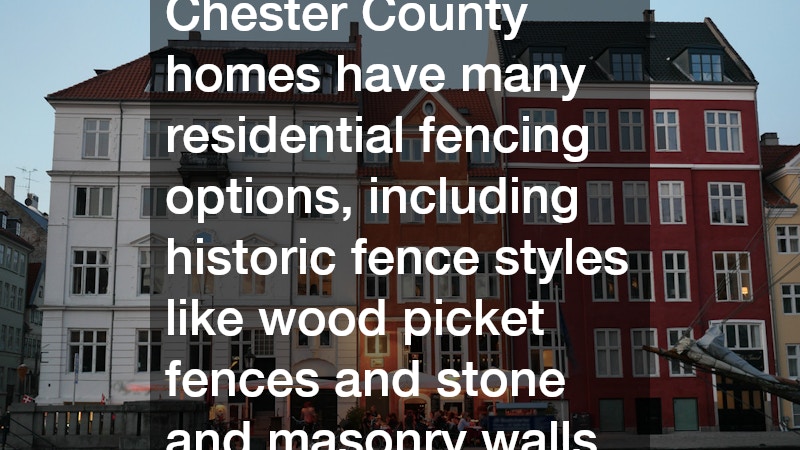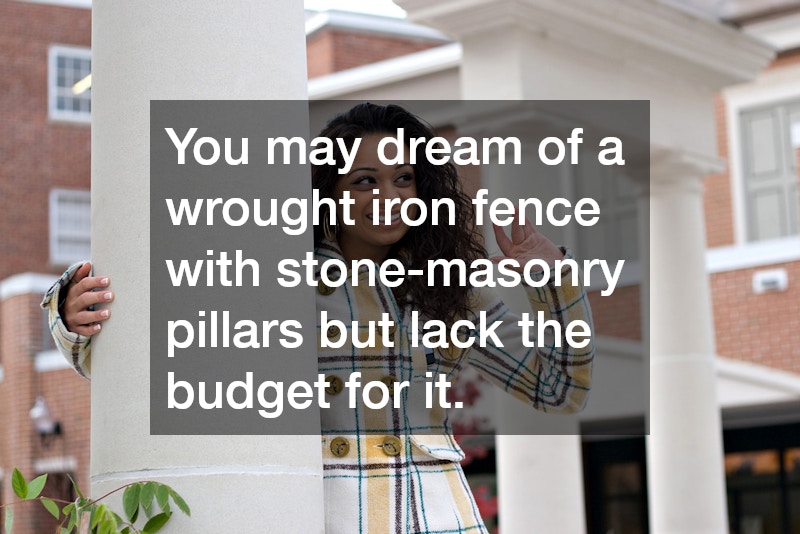
Chester County homes have many residential fencing options, including historic fence styles like wood picket fences and stone and masonry walls. Which fence models best suit your home depends on your property and the code requirements of the town in which your property lies. Common fencing options include:

• Wood privacy fence
• Vinyl privacy fence
• Wood picket fence
• Vinyl picket fence
• Composite privacy fence
• Chain link fence
• Wrought iron fence
• Metal panel fence
• Split-rail fence
• Wire fence
• Shadowbox fence
• Stone masonry walls
• Brick masonry walls
• Lattice fence
• Steel fence
• Aluminum fence
Among that lengthy list of options, homeowners can find modern fence panels and old-fashioned designs, such as wrought iron.
Setting Fencing Goals
Set your goal for fencing your yard first. Some fencing designs create a private yard, while others divide a space by use. A security fence doesn’t necessarily provide privacy. Your goal decides whether you need a complete privacy fence or one or two-foot tall garden walls.

Setting a Budget
You may dream of a wrought iron fence with stone-masonry pillars but lack the budget for it. Set your budget before you design your dream fence. Every fencing material costs a different amount and labor costs for installation vary, too.
Choosing Fencing Materials
There are a variety of residential fence styles and materials found throughout the country. While some homeowners may prefer wooden fences, others choose metal or other materials, such as stone or brick. Instead of having a privacy fence surrounding their property, some homeowners may prefer to have a more open option. Specific requirements for residential fencing will vary depending on the jurisdiction.
Property Lines and Residential Fencing Requirements
The property line will determine where a fence is installed. While some jurisdictions mandate that fences should be set two inches from the property line, others require fences to be set four, six, or eight inches away from this point.
Residential Fencing Permits
Permits may not be required for all types of residential fencing. If a fence is less than seven feet high, then a permit may not be required. For residents of Durham, Connecticut, however, fences that are less than six feet high are only permitted on a property line’s rear and side yards. It’s important to note that due to existing legal codes, permits are required for swimming pool barriers.
Safety Enclosures for Swimming Pools
When homes have pools, they need to be enclosed by safety fences or barriers. When this measure is taken, it can assist with preventing accidents. As previously stated, there are legal codes in place for pool enclosures. Basically, these barrier fences need to be a minimum of four feet high. A minimum of four feet of clearance at the bottom is also required.
Residential Fencing Maintenance
There are a variety of steps to take in order to keep fences well-maintained. In addition to having fences inspected on a regular basis for immediate or potential repairs, it’s also important to have them cleaned to enhance their appearance. When homes have wood fences, for example, experts recommend that they should be painted or stained once every two-to-three years. In areas that experience inclement weather, painting and staining may be needed more often.
Residential Fencing Service
Whether you want to have your existing wood fences replaced or new fences installed, your local residential fencing service will be able to assist you. The costs associated with having a fence installed will vary and depend on a variety of factors. This includes the length and height of the fence as well as the materials used. If you’re interested in having a six-foot privacy fence installed, for example, the minimum average cost may be approximately $7.00 per linear foot.
In addition to providing privacy, fences can also enhance your home’s curb appeal. When you’re planning to sell your home, this has the potential to raise your property’s value and its selling price. Another important reason to have a fence installed is when you have, or are planning to install, a swimming pool. A pool enclosure will provide a valuable safety feature. Once you speak with your residential fencing service, you’ll be able to discuss your ideas, receive recommendations, and learn more about your fencing options.